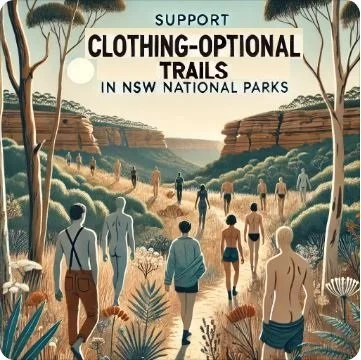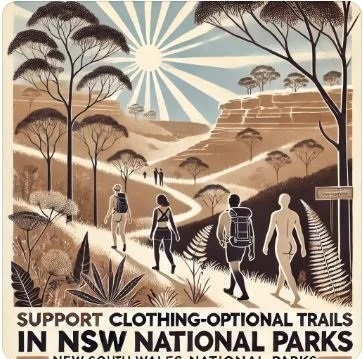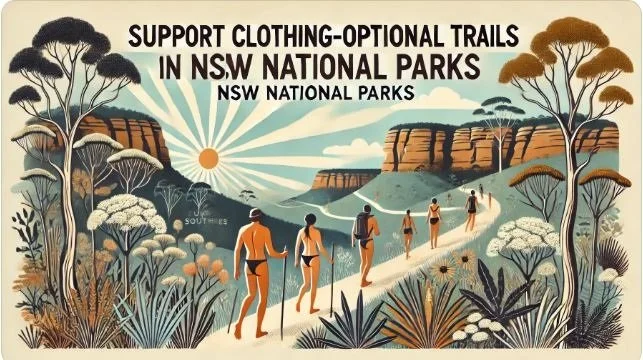Petition for Clothing-Optional Trails in NSW National Parks
Background Story:
Naturism, or clothing-optional recreation, has a long tradition of promoting body positivity, freedom, and a unique connection to nature. Around the world, dedicated clothing-optional spaces provide naturists and others the opportunity to experience the outdoors in an unencumbered, respectful way. In Germany, designated naturist trails in national parks have flourished, setting an example of how such spaces can be managed effectively while fostering inclusivity and supporting public wellness.
In New South Wales, naturists and supporters of body acceptance would like to see a similar initiative: the establishment of designated clothing-optional trails within semi-remote or remote areas of select national parks. These trails would offer naturists, along with those interested in a more holistic and free connection with nature, a safe and welcoming space. The benefits of such trails align well with the National Parks and Wildlife Service’s goals of encouraging public enjoyment of NSW’s beautiful landscapes and promoting mental and physical well-being through contact with nature.
This petition supports a pilot program in NSW national parks. Once proven effective, the initiative would seek to expand into other Australian states, demonstrating NSW’s role as a leader in eco-tourism and inclusivity.
Why We Need Clothing-Optional Trails:
Promoting Inclusivity and Body Positivity: Clothing-optional trails would offer a safe, designated space for people to embrace body freedom, free from judgement, while being part of a diverse, accepting community. This space can empower people to feel comfortable in their own skin, surrounded by nature and like-minded individuals.
Health Benefits for Participants: Research highlights that naturism has significant mental and physical benefits, including reduced stress, improved self-esteem, and a greater sense of connection to nature. Nude hiking encourages complete immersion in nature, allowing people to feel unencumbered by clothing, which can add to feelings of relaxation, vitality, and stress relief.
Economic Opportunity and Eco-Tourism Growth: The naturism and nudism industry is valued at several billion dollars worldwide, with major contributions from countries that have embraced designated clothing-optional spaces and resorts. Australia, with its stunning landscapes and diverse ecosystems, is ideally positioned to become a global naturism destination. Yet, the country lags behind in providing spaces and infrastructure to support this growing industry. Establishing clothing-optional trails in NSW would attract local and international visitors, generating revenue through eco-tourism and helping to support local economies.
Learning from International Successes: Germany’s long-standing success with clothing-optional trails has demonstrated that naturist areas can peacefully coexist within larger public spaces. By implementing designated trails in NSW, we can benefit from a tried-and-true model of responsible and respectful naturist spaces, enhancing the diversity of experiences available to national park visitors.
Ensuring Responsible Use and Environmental Care: With designated trails, we can establish guidelines that promote respectful and sustainable use of national parks. Educational signage and outreach would ensure that naturists, and all visitors, appreciate the natural environment and maintain its pristine condition.
How It Would Work:
Designated clothing-optional trails would be strategically located in remote or semi-remote sections of national parks to minimise interaction with other visitors. Clearly marked signage would inform visitors of the clothing-optional status along these paths. Naturis Sancta is committed to supporting this initiative by funding signage and helping develop materials to promote responsible, respectful use of the trails.
Below is an open letter to the NSW National Parks and Wildlife Service in support of this proposal:
Subject: Proposal for Designating Clothing-Optional Trails in Selected NSW National Parks
To the New South Wales National Parks and Wildlife Service:
Introduction: We propose the creation of designated clothing-optional trails within semi-remote or remote areas of select New South Wales national parks. This initiative aligns with the National Parks and Wildlife Service's objectives to foster public appreciation of nature, promote mental and physical well-being, and encourage responsible use of NSW's natural heritage. We believe that establishing clothing-optional trails can bring unique benefits, enhance visitor diversity, and foster inclusivity in a manner that is respectful to the environment and mindful of all visitors.
Common Goals and Potential Positive Outcomes:
Fostering Inclusivity: Offering clothing-optional trails creates a welcoming space for naturists and promotes acceptance and diversity. Naturism has a long history of advocating for body positivity, freedom, and a deep connection with nature—values that align with conservation and sustainable tourism.
Mental and Physical Health Benefits: Scientific research indicates that naturism can lead to increased mental well-being, reduced stress, and improved body image. Nude hiking, specifically, allows individuals to experience nature in its purest form, free from societal constraints, and has been linked to lower stress levels, enhanced self-confidence, and increased vitamin D absorption.
Promoting Eco-Tourism and Community Engagement: The establishment of clothing-optional trails could attract new visitors, encouraging respectful and responsible eco-tourism. With signage and well-considered guidance, these trails would serve as controlled environments, benefiting not only naturists but also the broader community who value body positivity and a deep connection with nature.
Successful Precedent: German Naturist Trails Germany's national parks provide a successful model of dedicated clothing-optional trails, which have been maintained for over a decade. These trails have demonstrated how designated spaces for naturism can function effectively without issues of public indecency. These trails are also strategically placed in semi-remote areas, making them accessible yet minimally intrusive, ensuring a respectful experience for all park visitors. Feedback from these German initiatives reflects an appreciation for the dedicated spaces and demonstrates that naturist areas can exist harmoniously within larger, multi-use parks.
Proposal for Implementation in NSW: We recommend that designated clothing-optional trails in NSW national parks could follow a similar model. Placing trails in remote or semi-remote sections will minimise disturbance for non-naturist visitors, and clearly marked signage will inform users of the designated clothing-optional status. Naturis Sancta offers to contribute toward the costs of this signage and to assist in developing informational materials to educate and encourage responsible use of these trails.
Legal Considerations and Community Cooperation: While Section 633 of the NSW Local Government Act 1993 empowers local councils to regulate nude bathing and certain public activities in their jurisdictions, it establishes a foundation for creating specified areas where clothing-optional use is formally permitted. Although Section 633 does not apply directly to national parks, it illustrates a precedent within NSW for designated areas where public nudity is permissible, supporting public decency standards while fostering inclusivity.
Naturis Sancta’s active support, both financially and operationally, can alleviate potential administrative or financial burdens associated with establishing such spaces. Additionally, we are committed to working closely with local communities, environmental groups, and the NPWS to ensure that these trails meet high standards of environmental stewardship, safety, and respect for all park users.
Conclusion and Future Potential: Designating clothing-optional trails within select NSW national parks is a progressive step that aligns with shared values of conservation, inclusivity, and wellness. By drawing on successful models like those in Germany, and ensuring that trails are well-signed, responsibly used, and located in appropriate remote or semi-remote areas, this initiative has the potential to enhance visitor engagement, contribute to eco-tourism, and promote a culture of respect for nature and each other.
Once this pilot program has proven effective, we are committed to advocating for the expansion of clothing-optional trails across other Australian states. With NSW leading the way, Australia could become an example of how to inclusively and respectfully manage naturist spaces, fostering a more inclusive outdoor culture.
Thank you for considering this proposal.
Sincerely,
Vincent
Founder & Elder of Naturis Sancta
Support This Petition: https://chng.it/yxcvz2pWL4
Click on the images above to be redirected to the petition - Thank you
Your support is critical to making designated clothing-optional trails a reality in NSW national parks. By signing, you contribute to fostering a respectful, inclusive environment where people can enjoy nature freely. Let’s show that Australia can lead in sustainable, inclusive eco-tourism and set an example for other states to follow.



